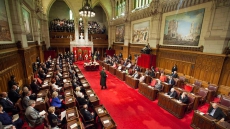OTTAWA — A briefing book prepared last fall for incoming Finance Minister Bill Morneau warns that Canada's spending on public pensions is dramatically lower than many other rich countries — even though private-sector pension coverage has deteriorated.
The document, obtained by The Canadian Press, said that between 1991 and 2013, private-sector pension coverage fell from 31 per cent to 24 per cent.
But at the same time, the document suggests the federal government is not picking up the slack.
Canada spends "significantly" less on publicly funded pension support — through programs such as the CPP/Quebec Pension Plan, Old Age Security and the Guaranteed Income Supplement — than other OECD countries, the briefing states.
A chart in the briefing binder projected Canada to rank No. 17 out of 20 countries in 2015 for public pension spending as a percentage of gross domestic product, with just over five per cent. It said the average OECD spending was projected to be 9.5 per cent of GDP.
The document also highlighted concerns that younger Canadians aren't saving enough for their eventual retirement.
And while the number of private-sector pensions rebounded after the mid-2000s for young adults, there was a shift away from the more-desirable defined-benefit plans, said the heavily redacted note obtained under the Access to Information Act.
Between 1991 and 2013, defined-benefit coverage dropped to 11 per cent from 26 per cent, the document said. Meanwhile, a chart in the briefing binder showed that the percentage of defined-contribution plans had gradually increased.
The adequacy of pension plans will be front and centre for Morneau next week when he meets with his provincial and territorial counterparts to discuss the possible enhancement of the Canadian Pension Plan.
During those talks in Vancouver, Morneau will push the federal Liberals' quest to persuade enough provinces and territories to reform the CPP. A change would require support from seven of the 10 provinces representing two-thirds of the country's population.
Any boost to CPP would be part of a long-term plan to address concerns about future generations of retirees rather than providing help for today's seniors.
In fact, Morneau's briefing document also included data showing that Canada's retirement income system has been effective in reducing poverty among seniors.
It cited Statistics Canada data that found the share of seniors living in low-income families plummeted from about 29 per cent in 1976 to 5.2 per cent in 2011. Older Canadians fared better than the overall population, which had a low-income rate of nine per cent.
The briefing also said seniors poverty was concentrated among single people living in large urban areas, such as Toronto, Montreal and Vancouver.
Canada's seniors poverty rate was also lower than many industrialized countries, the note said. The document included a chart that showed Canada was ranked No. 3 in 2013 among 14 OECD countries in terms for its seniors poverty rates — the average was 12.8 per cent.
Of course, not all Canadian seniors have left the workforce.
The document pointed to the labour-force participation rate of Canadians aged 55 to 74, which rose from about 30 per cent in 1995 to over 47 per cent in 2014. The OECD average in 2014 was 41 per cent.
The briefing note also said that the country's aging population underscored a need to increase job-market participation among older workers because the decline of working-age Canadians "will put downward pressure on economic growth going forward."


